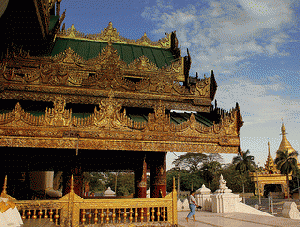An alliance of civil-society organizations launched a report which rejects any forms of human rights violations during the implementation of the Kaladan Project, and calls for accountability for all stakeholders involved in the project, especially towards India and Burma Governments. The report -' One cannot step into the same river twice: making the Kaladan Project people-centered -- was released Tuesday in a press conference at The Foreign Correspondents' Club of Thailand in Bangkok.
The Kaladan Project report was jointly brought into being by the "Kaladan Movement', an alliance of civil-society organizations concerned about the human rights, social, economic, and environmental impacts of the Kaladan Project for local residents. The core members of the "Kaladan Movement' are the Arakan Rivers Network (ARN), the Chin Human Rights Organization (CHRO) and the Zo Indigenous Forum (ZIF).
The speakers who gave explanation of the Kaladan report at the press panel were Salai Za Uk Ling from the CHRO, Twan Zaw from the ARN and C. Lalremaruata from the ZIF based in Mizoram, India.
The report provides a synopsis of the recent on-the-ground impacts arising from the lack of transparency, and focuses on the concerns and hopes of the local people. The report also tries to underline the prospective benefits of the venture, particularly for Arakan and Chin States, the two most impoverished regions of Burma.
The report tells apart the need for better infrastructure and the potential benefits of increased trade opportunities for local farmers and producers. However, it raises tough questions about the prospect of further land confiscation and forced deportation, disruption and loss of existing livelihoods, and increased militarization relating to the project.
According to the report, until now, no Environmental Impact Assessment (EIA), Health Impact Assessment (HIA) or Social Impact Assessment (SIA) have been conducted for the Burma-side implementation of the Kaladan Project or findings are never made public.
In February 2012, Burmese government officials promised to conduct an EIA and SIA for the Kaladan Project. During a press conference on 15 February 2012, presidential adviser KoKo Hlaing -- alongside representatives of the Burma Port Authority and Inland Waterways Authority of India -- guaranteed that the Burmese government would conduct an EIA and SIA before any future large-scale development project.
The following week, in response to a question raised by Dr. Aye Maung chairman of the Rakhine Nationalities Development Party (RNDP) in the Upper House, Minister for Transport U Nyan Tun Aung stated that the government would coordinate with Indian counterpart to carry out an EIA and SIA in order to minimize negative consequences from the Kaladan Project.
According to Kaladan Movement research, to date, people living in the Kaladan Project area are not aware of any concrete action taken by the government to follow-up on these important promises. There have been rumors that an EIA for the Phase 3 of the Kaladan Project has been conducted by a South Korean Consultancy under contract to the Indian Ministry of External Affairs, but no evidence of this work, nor the findings of the assessment have ever been made public, the report says.
"Local people must have full participation in major development decisions in Burma," said Twan Zaw from Arakan Rivers Network.
He also added, "Comprehensive environmental, social, and health impact assessments should be conducted and made public before the Kaladan Project proceeds any further. Unless the Kaladan Project is implemented with a people-centred approach, it may lead to increased tension between India and Burma rather than improving ties."
The $214 million Kaladan Project -- operational target in 2015 -- will provide inland waterway and highway transportation system connecting Mizoram State in Northeast India with a Bay of Bengal deep-sea port at Site-tway, Arakan State in western Burma.
The deep-sea port will transfer cargo from large container ships to smaller 300 tonne barges (from 50 to 200 meters in length) that will work the 160 km inland waterway north to a currently under construction port complex at Paletwa Town in Chin State. At the Paletwa port, cargo will be transferred to India-Burma border via a new highway. The Project, classified as Indian development aid to Burma, is a cornerstone of India's "Look East Policy" aimed at expanding Indian economic and political influence in Southeast Asia, the report clarifies.
Salai Za Uk Ling, Program Director at the CHRO, said, "Local people in the Paletwa area of Chin State haven't even been informed about the route of the highway in their area. How can they benefit from the project if they know next to nothing about it, or how it might affect them?"
The Kaladan Movement's report says that the 1.2 million people living along the route of the Kaladan
(Note: You can view every article as one long page if you sign up as an Advocate Member, or higher).






